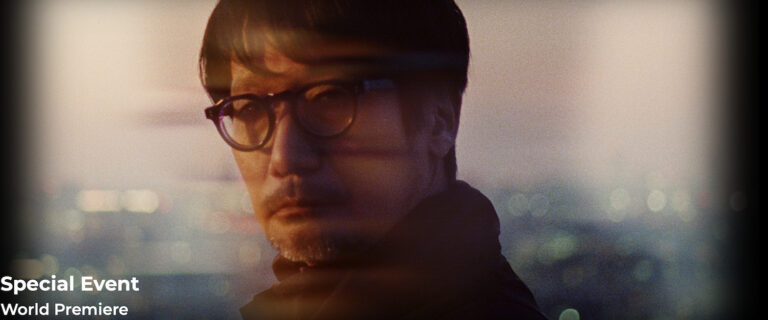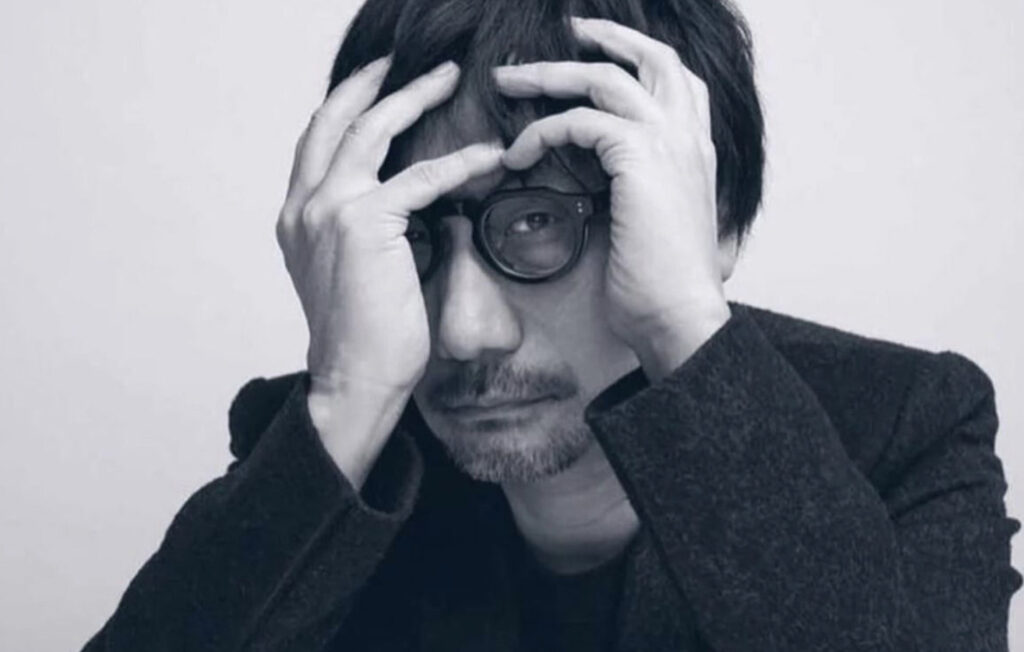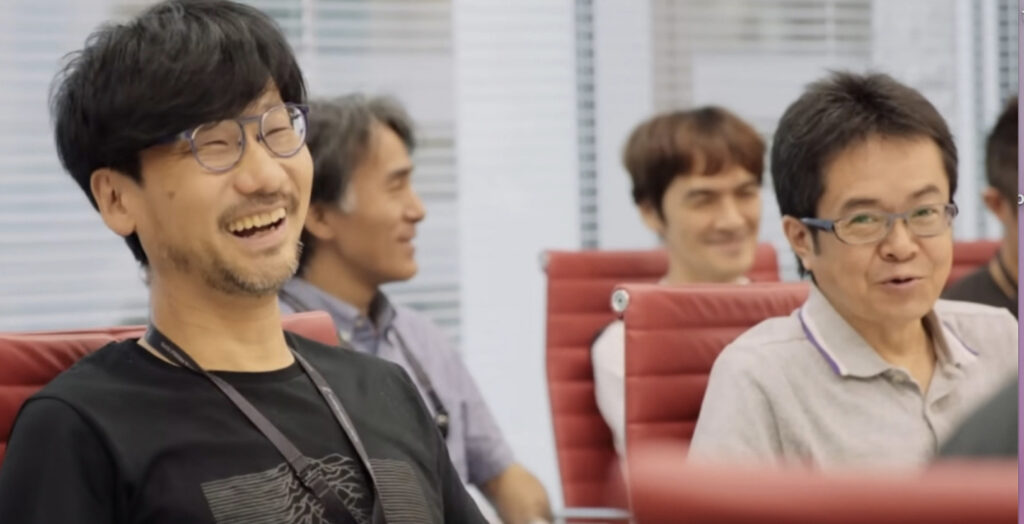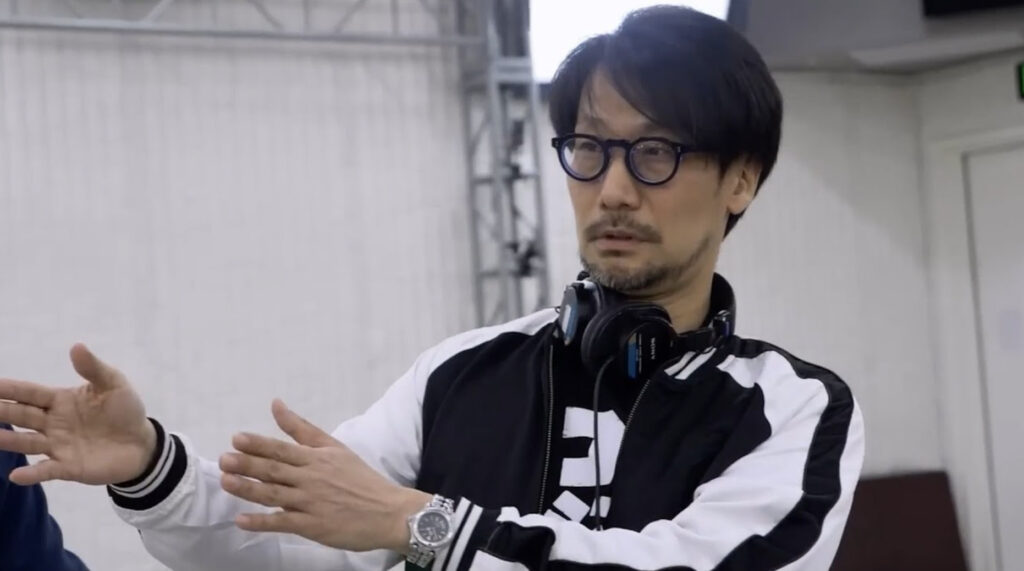
Synopsis : A journey into the creative mind of the most iconic video game designer in the world, this visually captivating documentary gives a rare insight into Hideo Kojima’s creative process as he launches his own independent studio.
Hideo Kojima (小島 秀夫, Kojima Hideo, born August 24, 1963) is a Japanese video game designer, director, producer and writer. He is regarded as an auteur of video game. He developed a strong passion for action/adventure cinema and literature during his childhood and adolescence. In 1986, he was hired by Konami, for which he designed and wrote Metal Gear(1987) for the MSX2, a game that laid the foundations for stealth games and the Metal Gear series, his best known and most appreciated works. He is also known for producing the Zone of the Enders series, as well as writing and designing Snatcher(1988) and Poicenauts(1994), Graphic Adventure Games regarded for their cinematic presentation.
Kojima founded Kojima Productions within Konami in 2005, and he was appointed vice president of Konami digital Entertainment in 2011. Kojima Productions split from Konami in 2015, becoming an independent studio. His studio’s first game without Konami, Death Stranding, was released in 2019.

Q&A with video game creator Hideo Kojima, subject of the documentary film “Hideo Kojima: Connecting Worlds” with director Glen Milner.
Q: The title of the film, “Connecting Worlds,” is something you came up with. Why did you decide to name it that?
G.M: It’s through listening to Hideo talk about what influenced him and how technology could be used to connect on a human level with people as a force for good. And definitely, by talking about a fractured society and reconnecting people. It’s naturally aligned with gaming.
Q: Hideo, your career is linked to connecting with an audience, but also by connecting different mediums together. In your tour bio it says that 70% of your body is made for movies. Now a movie about you is somehow a part of that 70%. Why has it been so important for you to blend these mediums together, blurring the idea that what is cinema and what is gaming, and by connecting the different entertainment mediums together?
H.K: When I was a child, there was no gaming, I was just watching movies all the time. It was all different. Movies and games were all different. But now it’s all connected through digital [technology]. I grew up watching films and became a game creator. I was talking with Glen about this movie and was very surprised to see recently that, every time I meet directors or actors — for them, they became directors who grew up playing games. I then realized that, “Hmm, it’s the norm right now.” That’s why I talked with Glen and said, “Hey, we should do something together.” Everyone is really naturally connected already.
Q: Doing this film with Hideo as the subject, many of the audience have known of him for decades and have been huge fans of his work. Why did you want to make a documentary about Hideo?
G.M: I think there’s a game called “Metal Gear Solid.” It had an influence on me at school as much as any film. It was the first game that I ever played where people would go to each other’s houses just to watch each other play. If they didn’t happen to play, they would all want to know what’s happening in the story; you would have to figure it out. It’s going to be insightful and lead to all kinds of other means of creativity and inspiration. So it’s a no-brainer.
H.K: What Glen and I really have in common is music. Every time we meet, Glen gives me a lot of CDs. He didn’t give me one today though but I see him all the time.
Q: We really get to step into the creative process with Hideo and get a sense of how he leads and directs the team. It was great to see him playing the game and commenting. What was interesting about Hideo’s creative process and how he leads his team? You have the auteur, but a lot of it involves others with their vision and how they bring them along. It was really insightful to see some of that. What is your take as to how Hideo leads his team?
G.M: The thing that struck me was the amount of detail. If we were making a film [along the lines of] “the making of,” it would be 10 hours long. The main teams on a film, you get into the edit and look at transcripts, and you think… They’re just talking about one element at a time for two hours. I think that the speed of filming a documentary, and a lot of decisions are fast. I It was much more detailed and nuanced to do with games. But sometimes in terms of filming, the detail and attention to it, and the thought of every single aspect of it was quite interesting.
Q: Hideo, in the film, you talk about 1986 and your first game. Now you have much larger teams, bigger budgets, and expensive production value. How has directing games changed for you? Is it harder to make games today — and harder to lead the team?
H. K: It’s difficult to explain. But when it started streaming, the world was paying attention. As I said in the video, everyone said, “Don’t do it.” So I did it immediately. The specs of the hardware was very low. I couldn’t express anything. And I did everything from scratch. But now it’s vice versa. With the hardware now you could do any and you have to watch for everything. Before, with the people in our studio, usually that game was made with six people. Now it’s almost like a factory. For us, it’s different. Any of these movies, you have to fight with the big budget movies. So that has changed like that, these days of creating games.
Q: This is a documentary of your career, and it’s very much a career that’s ongoing, with many things still to come. But when did you first feel successful, like when you connected with audiences and were proud of the work that you were creating? Did it start back in the late ’80s or do you remember a certain moment?
H.K: I don’t feel that now. [laughter] Every time I release a game I feel like this is my last, so every day that I release it I feel proud. It’s difficult to create a game. It was said that in your 30s, you’re done — you need more power, and you have to create games within your 20s, that’s what was always said. And you go on to management after you finish the games in your 30s. Then in your 40s, you control the board room you created. I’m going to do that. So in order to stay, I became a producer. To be a producer, I became a member of the board. Right now, I’m more free. What I’m having fun at is [that] I’m still in that moment, and maybe I don’t have so much time to live, but I want to keep doing it as long as I live.

Q: Have there been games or projects in your career where you feel like you didn’t connect with an audience. You were disappointed that an idea didn’t translate. What is your view when you look back over the past 30 years? Is there a certain project or game that you feel didn’t reach the success that you wanted it to or deliver the message that you wanted?
H.K: Every time, even with Metal Gear. It was only 10 years after when the original was released that it was evaluated highly. Also Boktai and Pokemon. A lot of people were unhappy with how I used it, but it was successful. Recently, they evaluated it as “High”. I don’t really care about the initial reactions, to be honest. I have my own studio. I believe that if I have opposing ideas from everyone, that will lead to more success. So I think about that when I bring new ideas to the table.
Q: Glen, when you were talking about these subjects, were there any common themes that came to you? It seemed pretty easy to get a lot of amazing people talking about what his work inspires.
G.M: Yeah, a lot of people want to talk about the storytelling, and Hideo’s storytelling, it’s the cinematic nature of how he moves people in his games. I wanted to speak to people who know about video games as an art form as well. It lends itself for them to speak about Hideo in that respect, because of it being across everything, and how games should be looked at in that light, compared to films in the movie form. It’s quite easy for them to speak about Hideo in that respect, in terms of how we wanted our take about how games can transport humans into another life. It was quite easy for them to talk about him. I didn’t have to convert anyone.
Q: We’re at an interesting point in the gaming industry where we’re seeing some game creators cross over to do TV series or movies, or a lot more adaptations of games. Hideo, now that we have a film about your career, and how much you love movies, yet you’ve really focused your whole career on making games. What are your aspirations in terms of directing a film or being involved in a series? Is that something that’s exciting to you, or do you feel like your talents are best used in the gaming medium?
H.K: For me, film is essential. I can’t do it. I’m a perfectionist. A game, no matter how much I make it perfect, it doesn’t end. People come to it, play it and I have to mix and everything. I think I will never finish making it if I start making a movie. I’ll be doing it all day. So after [seeing your] filmmaking method, I’ve got a lot of love all over the world and great conditions to direct a movie. Since I made two productions, I have staff. If I were to film and direct a movie, I’d have to get out of the studio for about a year. I can’t do that and leave my staff. So six, seven years in my studio, I’ve thought about it. I want to direct movies, too. But I’m also doing a new game, and also desperately needed to do a movie — I’m working on that.
But I’ll be 60 this year. See? I’m a little old already. I asked Guillermo Del Toro when we were 30, “What should we do in our remaining lives?” I said, “I’m doing these games and these projects” and he said “I’ve got offers. But if I do it, the studio might not be interested. So just keep doing what you’re doing.” I thought, “Okay. I want to make something here that makes people happy.”
Q: Glen, coming from the traditional entertainment industry into the gaming industry, what’s your impression of where games are now as a medium and where they’re going? Someone like Hideo and what he’s doing, it feels like that is going to blur into interactive movies and they’ll be made with gaming technology. Where do you think the gaming medium is going to go moving forward?
G.M: It’s interesting because when we interviewed Nic [Nicolas Cage] first, he spoke about being almost jealous of the freedom within game design. There are some other limitations now for commissions, for feature films, and I do wonder if they have encroached on this before. People growing up influenced by “Metal Gear Solid”, by games, will then go into movement. I’m very interested in what they see there. I think it’s very interesting that the next generation of filmmakers are influenced by video games, and I’d say that maybe people are afforded more freedom in games. There’s an interesting concept in that.
Q: Hideo, your games always have a deep meaning or message. You’ve said recently that you were rewriting it all after going through the pandemic. Thinking about the themes of your games, where is your mind right now in terms of what you want to communicate to audiences about family, wars and connection?
H.K: I can’t see anything. I’m a human, same as you guys. I’m not a thing. I don’t see the future. I’m slipping, just like you. I see the news and I write the plots. Future, I’m happy, but I always absorb that into my games. I want to trade something that’s not out there yet. It doesn’t have to be me to find or create something that’s already known. I want to do something that no one has done, and I want to stimulate everyone. And as long as I live — a short life span, maybe — I will always do that. See, film and games were different, but now they’re closer. It’s all the in-between building — movie-like games or game-like movies. Tribeca, this is a film festival. I’m a 59 year old guy, ending-beginning. Passing along, becoming a documentary at Tribeca. Isn’t that something? This is part of what we do. You see my point? It’s not life. It’s a game or it’s a movie or whatever. It doesn’t really matter to the people anymore. Don’t care about eat[ing] Japanese food or Western food or Chinese food. Food is food. Everyone likes all kinds of food. It’s similar to the bank.

Q: You talked a few times about being 60 years of age, and hopefully you have many, many more productions ahead of you. Is there anything that you want to accomplish in your career that you still want to do?
H.K: I want to go to Outer Space and be in a game that you can play in space. Because right now, all games, you can’t play those in space. So please, someone, send me up to Space.
Q: The AI everyone’s talking about, you said you were going to create an AI of yourself so you could live on forever. How much do you think about that? How much do you think it’s going to impact your ability to create? Is it going to help you — is your team already thinking about that? And thinking about the AI, in terms of script art work and things like that. What is your take on that?
H.K: I don’t think that AI will take over. Humans should be above it. But AI has come into our lives. It’s not like we don’t use AI. It’s really up to how you use it. With AI, maybe it would be faster [to make some things]. But the creator has to learn what to do — something that’s time-consuming and won’t do. But I think it’s a really exciting future. I will make the AI [create] a game or two so that they will help me elevate war. You’re supposed to laugh, sorry. [laughs]
Q: Glen, what do you hope the general audience takes away from this film?
G.M: In terms of Hideo’s process, there’s the amount of depth of thought that goes into his work. It shows that he doesn’t just fall straight into making something, everything comes and is stimulated from an idea, and that’s something to wrestle with and think about. What we do in our film, is to balance out the present day and to show his influence growing up and how that evolved along the way. Video games as an art form and as a storytelling medium are here to stay.
Q: Hideo, what do you hope the audience takes away from this?
H.K: There’s not so much in the movie of a moving moment. But I will stand up and move on from today. But it was so refreshing [to present], so I want to say thank you.
Check out more of Nobuhiro’s articles.
Here’s the trailer of the film.

